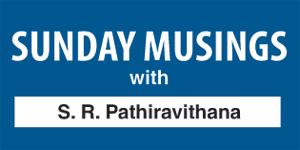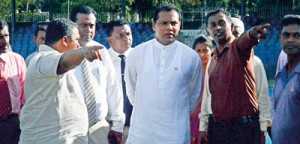Careful planning doesn’t necessarily ensure success
View(s):“The best laid schemes o’ mice an’ men gang aft agley”. The definition of it could be explained in this manner – “Even the most careful planning does not necessarily ensure success.” Of Mice and Men is a short novel written by author John Steinbeck. Published in 1937, it tells the story of George Milton and Lennie Small, two displaced migrant ranch workers, who move from place to place in search of new job opportunities during the Great Depression in California, and talks of the travails that they encounter.
 Indeed it is not the nicest of compliments that one could think of a situation akin to above, yet, often we do encounter such incidents in our day-to-day existence. There are many examples similar to Milton and Small episodes — like the love-hate episodes in Lankan cricket – episodes that have certainly impeded the progress of the great game of cricket in this little island of Sri Lanka.
Indeed it is not the nicest of compliments that one could think of a situation akin to above, yet, often we do encounter such incidents in our day-to-day existence. There are many examples similar to Milton and Small episodes — like the love-hate episodes in Lankan cricket – episodes that have certainly impeded the progress of the great game of cricket in this little island of Sri Lanka.
Remember the infamous 1973 England cricket tour during which the selectors also became prospective players. This culminated in the unforgettable promulgation of the 1973 Sports Law by the then Sports Minister K.B. Ratnayake. The law was passed with all good intentions but the end result was not healthy at all for any living sporting individual. It ended up as a monster that has taken our sports several steps backwards.
In spite of all this, the game progressed and by the early 1980s Sri Lanka was made a full member of the International Cricket Council. By 1996 Sri Lanka was strong enough to produce a team led by strong willed Arjuna Ranatunga to win the Cricket World Cup that year.
The World Cup victory truly transformed the outlook of the game of cricket in Sri Lanka in all dimensions. Just as it came as a blessing for talented players to elevate the game to international standards, it also opened new portals for untold riches. However the main drawback of this development was the systematic degeneration of the administrative structure – a process that began to devour the game of cricket.
At one stage, the process was shaping up well with the people of the calibre of Gamini Dissanayake and Ana Punchihewa adorning the pedestal. They had the game’s interest at heart. But later, the game was beset by power games, leading to the emergence of an unholy triangle, which retarded the system immensely.

What’s next?
Initially it was a duel. Two business barons Thilanga Sumathipala and Upali Dharmadasa were the first Sumo grapplers. The seconds for the duel were the then Sri Lanka cricket captain Arjuna Ranatunga and the then Sports Minister S.B. Dissanayake. However the duel did not last long as the then incumbent, Cricket Board chief Upali Dharmadasa, did not seek office after he completed his term.
Soon the battle became a test of wits between Sumathipala and Arjuna Ranatunga. The cold war is still smouldering. Both tried their wits and strengths – money versus guile. As a result, the game faced its own spots of strengths and weaknesses. First it was Ranatunga using his influence as a son of a politician who could do a thing or two and his credentials as the captain of the World Cup winning team. Then he took to politics on the SLFP ticket. It was only a matter of time before Sumathipala wore the green hat and became a UNPer.
Two decades on, the embers are still raging within. Incidentally, the allegiance of political preference has changed. Now Sumathipala wears a blue hat and is a favourite of the political preference of the land. Appointed to parliament through the SLFP National List, he is now the deputy speaker in spite of losing his seat at the general elections.
Though blue in colour in true form, Ranatunga contested the last general elections wearing the green hat, a stance that he justified on the basis of his anti-Mahinda Rajapaksa sentiments. Yet, both are political heavyweights in the President Maithripala Sirisena camp.
Also amidst this raging struggle for power, there were also other developments. First was the introduction of Interim Committees shaped and fashioned by the Ranatunga doctrine. Through the line – the politicians in power resorted to this system to throw out the undesirables. Though this mechanism kept Thilanga Sumathipala out of power in patches, it also kept Arjuna Ranatunga at bay, barring one occasion and that was in 2008. The then President Mahinda Rajapaksa named Arjuna Ranatunga as the Chairman of the Interim Committee of Sri Lanka Cricket as part of a political gimmick during a tight situation. The facilitator in this act was the then incumbent SLC head Jayantha Dharmadasa who resigned from his position. However the wedding lasted for only eight months.
During his reign as IC chairman, Arjuna Ranatunga crossed swords with many a personality including cricketers Mahela Jayawardena, Kumar Sangakkara and Lasith Malinga. The situation was similar to cricket’s first sin — the aborted tour of England of 1973. It was a tussle between a hastily arranged tour of England and a pre-signed IPL agreement, to which Jayawardena and Sangakkara were parties. This dispute between the IC and the two top players reached the highest echelons of power in the country at that time and the tour was doomed. Ranatunga never forgave any of the parties responsible. At the same time Ranatunga never was a favourite of Malinga the goldilocks.
His list of dislikes once again surfaced when Arjuna Ranatunga spoke to a TV channel recently. He took cudgels against Sangakkara and Jayawardena. His swipes came at a time when he was spelling out his wish to contest the top post at the next cricket elections at the end of this year.
Talking of the pending elections, there is a facilitator — Sports Minister Dayasiri Jayasekera. The latest episode began early this year when the then Sports Minister Navin Dissanayake in a surprise move resorted to the infamous Ranatunga doctrine of appointing an Interim Committee mainly under the influence of the Jayantha Dharmadasa faction. The move turned tables on pending cricket elections that would have installed Arjuna’s younger sibling Nishantha in power. Now an ambiguity on the eligibility rule has stalled the march of the Nishantha camp and it may be Arjuna — the likely candidate from that camp.
At the same time it is strongly rumoured that Jayantha Dharmadasa, another favoured political figure, would be the contestant from the opposite faction and helping him would be Sumathipala who is not eligible to contest because he is the deputy speaker of parliament. However they, too, have more than one axe to grind on this count.
All in all, the unholy alliance is at work once again. This indicates that persons with independent views would be shut out of the equation. Interim or otherwise, what Sri Lanka’s cricket needs today is balanced and wise governance. In short the much-talked-about “Yahapalanaya”.


